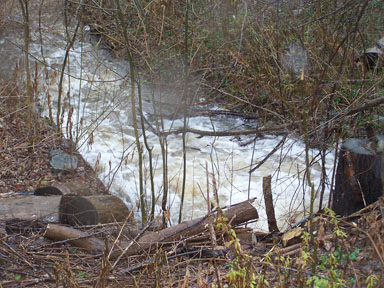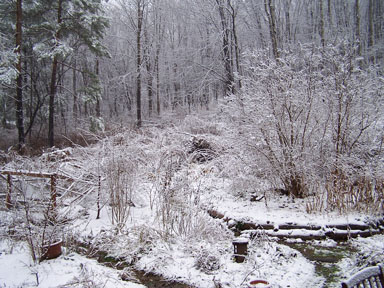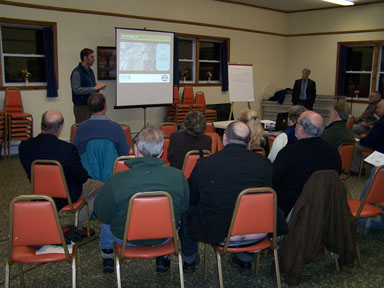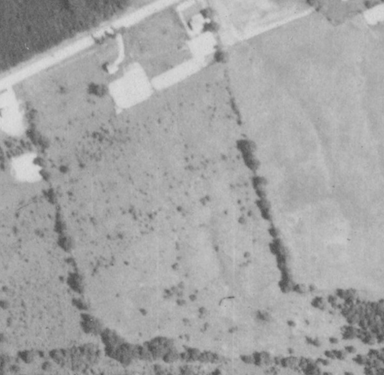December 1, 2010
Where is Varna, anyway?
There's a meeting at the Varna Community Center tonight to discuss a "Master Plan for Varna," but there's kind of a challenge in that very idea. Varna is a hamlet, and hamlets in this part of New York State are unincorporated places. The state puts up signs for them, but there's no official boundary.
It seems clear that the valley along Route 366 and Fall Creek, from about the F.H. Fox bridge to Forest Home Drive, is definitely Varna. As you go up the hills from there, it's less clear. Is Turkey Hill Road Varna? Is Route 366 out toward 13 Varna? How about Forest Lane and Monkey Run roads?
One of the first times I worked at the Varna pancake breakfast, an older resident told me in no uncertain terms that I didn't live in Varna. I was too far out, and the New York State Department of Transportation seemed to confirm that when they put the road sign about half a parcel west of my property line. Apart from that one woman and the DOT, pretty much everyone seems to agree that I live in Varna. (I'm slowly working to get the name "Robertson's Corners" in use for the intersection of 366 and Baker Hill Road, though.)
From a planning perspective, there's another complication, one I'm not very excited to point out. The Varna water and sewer districts mostly cover the "core hamlet" which the zoning defined as an amorphous mixed-use zone. The Turkey Hill and Monkey Run water and sewer districts cover an area running from about the intersection of Stevenson and Turkey Hill out to the 13/366 intersection. Apart from some commercial zoning near the intersection, most of that area has been marked Rural Agricultural, Rural Residential or even the more restrictive Neighborhood Residential in recent maps. It's escaped the "water plus sewer means build, baby, build!" that seems to have taken over recent iterations of the plan.
If Varna were ever to incorporate as a village, I'd recommend the water and sewer district boundaries (including Turkey Hill and Monkey Run) as the village boundaries. As things stand now, with the Town seeming far too fond of piling development into this corner, I'm not sure there's any way to convince residents along these outer and upper pieces of Varna that they want to call themselves Varna in this planning conversation.
"People believe in the purple and white."
This morning's Ithaca Journal reports on a variety of parent and alumni complaints about sports at Dryden schools, including coaching issues and uniforms moving to black and white from purple and white. (Update: more on this story at YNN.)
This week's Dryden Town Talk opens with a joint Town of Dryden / Village of Dryden meeting about the North Road water main and gives thanks for a variety of youth activities. Cathy Wakeman notes the Ellis Hollow Holiday Artisan Gift Fair this Saturday from 10:00am to 4:00pm at the Ellis Hollow Community Center, the Dryden tree lighting Saturday at 5:00pm, a fundraiser Saturday afternoon at the VFW, youth concerts, and a pizza fundraiser.
A few stories slipped by me earlier. A Ringwood Road family escaped from a fire before Thanksgiving, and Murray Cohen of Dryden insists that we "be compassionate toward the wealthy people of America".
Light flooding in Robertson's Corners
It's changed from rain to snow now, but it was a pretty exciting morning of waterfalls and mud.
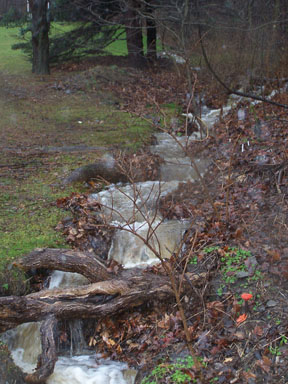
Waterfalls between my house and the neighbor.
Fortunately, the foundation and drainage work from last year seems to be holding up well.
I went exploring the neighborhood a bit, pointing the camera up the hill where the water was coming down and checking out my swales, as well as the local ditches and waterfalls.
Update: and now it looks like this:
December 2, 2010
If this is listening...
I'll have more to say about the Varna Master Plan meeting last night, which mostly went well, but first I'd like to spit out one especially indigestible bit.
When it came time to talk about opportunities, Larry Fabbroni, the engineer on the Varna II project, said he'd been "listening" and that if people looked closely, his project would address 85% of what people want. Steve Lucente, the developer of the project, has said similar things at past meetings - this is a recurring theme in their pressing ahead with the project. (January is apparently the new "soon", after the ZBA appeal.)
Unfortunately, "listening" not only means "hearing the words", it generally connotes actually doing something in response and maybe even sharing that something. We keep hearing that there will be something new to look at "soon", though that "soon" always stays a few weeks to a month away, and the basic numbers for the project - 260 units and 30,000 square feet of commercial space - don't ever change.
What makes this a lot worse, of course, is that Lucente's earlier proposal for a 170-unit development ran into almost the exact same set of objections a decade ago. Somehow "listening" to that conversation seems to have produced the idea that if people object to a big neighborhood-changing project, the way to respond to those concerns is to come back with a proposal that's half again as large and far more visible.
The developers do cherry-pick pieces out of the conversation when they fit what they already want to do, but I don't think the rest of us are blind for not being impressed. Add Lucente's having contributed to those problems with his lack of interest in maintaining the buildings he plans to tear down, and a far from perfect launch of his Observatory Circle project a few years ago, and this is some serious chutzpah.
December 3, 2010
Varna master plan getting started
Tuesday night's meeting at the Varna Community focused mostly on developing a plan for Varna, not Lucente's Varna II proposal, though there was some of that.
Environmental Planner Dan Kwasnowski and consultant Michael Welti of Behan Planning Associates led the conversation, with Welti presenting some introductory slides on the scope and schedule of the project, describing a similar project in Guilderland Center, and then leading a discussion of likes, concerns, and opportunities for Varna.
Some key points:
The scope of the study is what I'd call "greater Varna", including 366 from the Ithaca town line to the 13 intersection, as well as Turkey Hill Road to about Stevenson, Monkey Run and Forest Lane, Freese Road, Mount Pleasant Road, and Oak Brook Drive. (You can see the base map they had posted.) This worries me a little, as I'm not sure "greater Varna" knows this affects them. I was the only person in the study zone who lives east of the FH Fox bridge, and only one couple from Turkey Hill was there. (Update: In the end, the focus shifted back to "downtown Varna")
The project officially starts in Janury 2011, and aims for a conclusion in August 2011. There will be at least two meetings - a visioning meeting probably in March and a plan concepts meeting for April - between the start and end of the project.
They described a Study Advisory Committee of 7-9 people, including residents, small business owners, a large landowner, the Planning Board, Cornell, the state Department of Transportation and/or the county Metropolitan Planning Organization, and maybe others.
They'll also have stakeholder meetings and interviews, a project website, and updates on the Varna Community Center's bulletin board.
This may feed into zoning, but it's not a strictly zoning exercise. Transportation and even schools may be in the conversation, as well as other community-related projects.
The plan will examine possible shared visions, the carrying capacities of the hamlet's infrastructure and landscape, development alternatives, and identify actions for implementing recommendations.
The Town and planners acknowledged that they would build on the pile of input created by past Varna plans. It seemed like more than the usual nod in their direction, but we'll see.
Some of the things they hope to address include:
- Volume and speed of traffic
- Pedestrian, bicycle, and bus transportation options
- Cost-sharing models for improvements
- Land use plans and regulation
- Desired character and sample designs that show it
- Revitalization of businesses, homes, and the entrances to the hamlet
- Infrastructure needs
- Housing, including workforce housing and affordable housing
- Resource protection
- Trails, recreation, and public space
- How to implement the above: priorities, responsbilities, organization, costs, and funding.
The broader discussion focused on things people like about Varna, their concerns for the future, and opportunities.
Likes included:
- Location: easy and beautiful
- Community Association: people know each other, and have a shared history.
- Community Center, Varna Church, Varna Fire Company as strong core institutions.
- Landscape, between the hill and the creek, with "downtown Varna" in a valley.
- Small neighborhood/small town feel.
- The "back door" to Cornell
- Fall Creek
- Great walking, once you get there. Cornell Plantations, railroad track.
- Community center's commercial kitchen as small business incubator.
- Auto repair center, with small businesses involved in community.
- Doesn't feel overcrowded or empty.
- Living in the country.
- Historic housing patterns and architecture
- Birds, forests, and fields.
- Freese Road bridge
- Reynolds game farm and its pheasants
- Infrastructure - water, sewer, and cable.
- Schools - Ithaca.
Concerns included:
- Traffic -
- Volume at peak
- Speed off-peak
- Accidents
- Growth
- Erosion of quality of life
- Lack of support for families with children
- Less and less housing designed for family use
- Road/traffic
- Affordability
- Distance to Caroline Elementary School and ICSD's fondness for changing where Varna kids go to school
- Fading/Decaying Housing
- Some rental, some not
- Traffic discourages repair/maintenance
- Downward spiral
- Houses tight to the road in downtown Varna - how hard to put in sidewalk?
- Farm vehicles at 15mph (or is that a traffic calming device?)
- (Past) loss of grocery, drugstore, restaurant, etc.
- Eastern entrance to Cornell less attractive place to be when much development to your east
- Drainage problems at the bottom of the hill - 4 sump pumps
- Sewage issues - rising in parking lot
- Public transport schedules sometimes full buses, sometimes empty, often loud.
- Long-term future of Hillside Acres trailer park.
- Challenges of community on a busy road with people moving in and out
- Uncertain boundaries - what is Varna?
- Balance of rental/ownership, and landlord responsibility in particular.
- People spend their lives at Cornell, and home is just a place to sleep, not invest in community
- Cornell's land stewardship - massive amount of local land, have resources to change land use if they choose to.
- Concrete and gravel trucks for Cornell's apparently constant construction.
- Public safety beyond the road - minor property crimes, but Sheriff/State Police not a lot of protection. Cornell police do seem to be doing some speed control, though.
And opportunities included:
- Varna II proposers see the massive development they're working on as an opportunity
- Cornell is investing $20 million in its surrounding areas, including trails. Dan Kwasnowski noted that Syracuse University provides housing grants to employees willing to live near campus, and also that the railroad bed trail's future seems to depend on the game farm.
- A park & ride to reduce traffic through Varna.
- The Parke-Dabes Natural Area on Mount Pleasant to the south of Route 366. It's 55 acres of town-owned land.
- Setting priorities about what best to give up or invest more in.
- Small business opportunities. Already a substantial mix, despite losses to larger regional markets.
I've also posted a gallery of some of the slides and maps at the meeting. Unfortunately my camera battery died about halfway through, but hopefully it's still useful.
December 4, 2010
Pellet gun, pornography, Varna, more
There are lots of Dryden pieces in the Ithaca Journal over the last few days.
On the dark side, there's a Dryden student in trouble for bringing a pellet gun to school. A Dryden man was arrested on child pornography charges as well.
There's a brief write-up of Tuesday's Varna planning meeting and another on Monday's discussion of water north of the Village of Dryden.
The Ellis Hollow Community Center has a holiday gift fair today, and the SPCA needs canned food.
Carpenters protested an Ithaca project run by LeChase construction, which has an office just down the road from me. In broader political news, the Tea Party movement is active in Tompkins County, the county government is working out a ban on gas drilling on county-owned property. Anglers are concerned about state cuts to fisheries.
December 6, 2010
"I urge you to reject this appeal"
Dear members of the Town of Dryden Zoning Board of Appeals,
I re-read Lucente Development's appeal to you for a reduced acreage requirement on a Planned Unit Development. If you knew nothing about the state of Dryden's zoning beyond what's stated in this document, this appeal might seem reasonable. Unfortunately, the kindest thing I can say about it is that it's an attempt to grab what it can from the Town's existing zoning while justifying that grab with one small citation from the proposed zoning.
The appeal notes that the proposed zoning removed the acreage requirement for a Planned Unit Development. It omits, however, to note that:
This appeal would be entirely unnecessary under the proposed zoning, which includes language allowing this kind of construction.
The proposed zoning does not, however, allow quite this level of density - 10 units per acre rather than the 14.5 per acre allowed under current zoning or the 16 per acre Lucente Development plans here.
The proposed zoning's Planned Unit Development section continues to change. The acreage requirement in earlier drafts had been reduced from 100 acres in the existing to 25 in more recent drafts, and the requirement only fell to zero in the final Planning Board draft. The Town Board has not yet taken up discussion of this section at all.
The Town seems to have accepted that the proposed zoning's plans for the Hamlet of Varna are inadequate, and has established a Varna Master Plan study. Approving this appeal in advance of that study's work (due to complete in August 2011) seems like an excellent way to waste much of the money the Town will spend on that plan.
In short, I urge you to reject this appeal. The timing is wrong and the arguments supporting it are weak, citing fragments of uncertain future work and ignoring a vast number of counterarguments from that same future work.
Thank you,
Simon St.Laurent
1259 Dryden Road
Town of Dryden
The Route 13/366 Corridor Study and the Proposed Commercial Zone
When it appeared, I pretty much loathed the Route 13/366 Corridor Study. It was a zoning plan that pretended to be about traffic, with an outcome I think I can describe as predetermined at best by the dreams of the County Planning Department. Public input seems to have been structured primarily to justify what the planners wanted to do anyway.
(And no, I can't say that being told that the best use for my house is as a driveway to apartments mountain goats might enjoy inhabiting particularly improved my opinion of the plan. Of course, since they didn't seem to survey the terrain or listen to the residents...)
That very lack of listening is useful in some ways, though, as it gives the Corridor Study a strange abstract power, representing an unadulterated call for "nodal development".
So what did the Planners suggest?
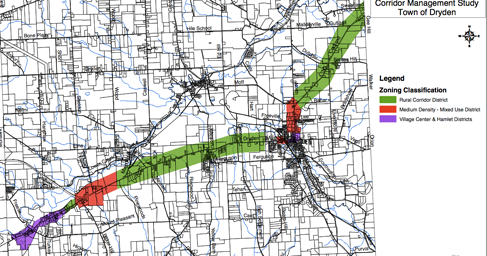
One vision of planning for Dryden's central highway core (From this original PDF).
The purple is village and hamlet development, and the red is what they saw as a mixed use commercial core. All of it is within easy access of both highways and water and sewer, and their proposal included mechanisms for dealing with the traffic they would create in those locations. The green, however, is "rural corridor district". That's not a "do not build zone", but heads that direction:
The area outside of the nodes can still be described as rural in character. Currently there are a variety of land uses scattered along the roadway including agricultural, residential, commercial, and industrial operations. It is recommended that zoning and regulatory provisions be put in place within these areas that preserve the low density of land development. In order to accomplish this, the Town should consider creating a Rural Corridor (RC) District....
The purpose of the Rural Corridor (RC) District is to support the goals, objectives, and policies adopted as part of the 2006 Comprehensive Plan. More specifically, the RC District is intended to allow the development of a variety of uses including residential, commercial, and industrial activity in a manner that preserves the undeveloped nature of certain areas along NYS Route 13. In order to accomplish this, the RC District regulates the location, design and use of structures and land to create a low concentration of activity in a rural setting and to ensure the safe and efficient movement of vehicles along the corridor.
Permitted Uses
The following uses are to be permitted within the RC District:
- Farming Operations
- Public & Semi-Public (private schools, fire halls, etc) uses
- Parks, Recreational Facilities, etc
- Single-Family Residential
Specially Permitted Uses
- Retail & Service
- Office
- Automobile Repair
- Warehousing & Storage
- Outdoor Storage
Note the total absence of denser housing possibilities in those uses, and the restriction of even many commercial uses. The idea here isn't to string dense housing along the corridor if water and sewer can reach them, but to keep this part of the highway corridor flowing smoothly.
Instead, the commercial zone now includes most of that "Rural Corridor" area, losing the distinctions the 13/366 plan made between the Rural Corridor and the possible nodes (Route 13/366 by NYSEG, Varna, and Dryden).
I think the proposed zoning wants to make a node possible by NYSEG, like that shown in Figures 16-19 of the plan (4.7MB PDF), but it doesn't pause to create any distinctions. It allows a wide variety of uses instead, hoping that developers and infrastructure managers won't do anything too awful along Dryden's busiest artery.
I worry that the mixed-use concept may have been promoted by the flawed Route 13/366 study, but somehow it became much more awful as it lost connections with what that study was trying to accomplish. The contrast is pretty bleak.
December 7, 2010
Selling a Development Vision
The Route 13/366 Corridor Study, for all its flaws, attempts to sell a vision of Dryden. One key piece that it tries to sell is a new "nodal development" east of the NYSEG building, along the 13/366 intersection. The description is pretty broad:
This area has significant potential for creative and forward thinking nodal development patterns as there is a significant amount of open land.
The concept in this area is to transition from the rural character of Route 13, east of the NYSEG area, into mixed use commercial and residential development, then to the existing industrial center. Figure 19 presents a concept layout of the area with single and multi-family homes adjacent to the future Dryden Trail, transitioning into commercial development along Route 13. The south side of Route 13 is limited by the existing topography and the concept presented contains commercial and industrial development along this area.
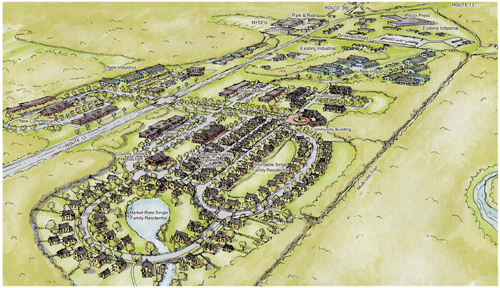
Proposed development on Route 13/366. (Click for PDF)
It is recommended that the Town coordinate with NYSEG on the relocation of the existing power lines and substation, north of Route 13. These facilities could detract from the final layout, look, and feel of the area. Further, as recommended above, the access to the development should be centralized and traffic calmed. A roundabout would be one possible way to slow traffic through the area and improve the safety. A second roundabout could be located at the western Route 13/366 intersection to again calm traffic and improve safety for the traveling public. (32)
Since it's hard to imagine what would motivate the creation of this complex, why is this interesting?
Well, for one thing, the document is effectively making a sales pitch. The creators of this plan hoped to make a difference in local zoning, and thought the way to do so was to present an attractive vision of what their planning vision might help create. And what did they come up with?
There's a lot of new light industrial here, mostly placed on the north side of 13 and closer to Pinckney Road. There's new commercial on both sides of 13, and there's a lot of residential. They seem to have understood that business comes from the road, as the commercial is definitely designed to take advantage of the traffic passing by - and there's some kind of large traffic-calming device at the main intersection.
What about that residential, though? How large is it? It's a little tricky reading this from a concept diagram, but there's actually enough detail for it to be useful. Comparing it with tax parcel maps suggests that it takes up around a quarter or more of two largely empty parcels, 44.-1-8 and 44.-1-9. They total 144 acres, but let's call this 30 acres for now.
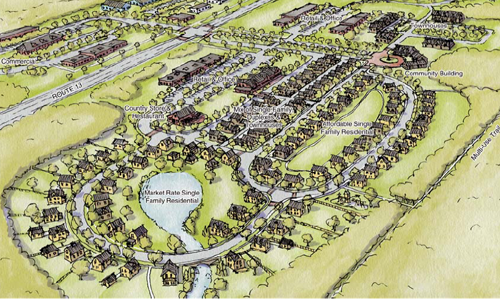
Zooming in to residential. (Click for PDF)
I counted buildings this morning, and found 30 market rate single family residential, 7 buildings in that area which are garages, accessory apartments, or both, 35 affordable single family houses, 15-20 townhouses, and around 30 likely units in the single/duplex/townhouse mix. That's about 122 units of housing in something like 30 acres - around 4 units per acre, surrounded by forest and along a trail. Even if I've miscalculated and it's 6 per acre, it's still definitely a lot less than 10 or 16.
I'd suggest that this is the kind of vision that results when selling your (weakly-justified) vision forces you to ask "what might people around here like?" instead of "how many units can I cram on that hillside?". It's not just a mix of uses, but a mix of housing types. There are corners of higher density, true - but the overall density stays within bounds that I haven't heard many residents argue is too high.
ZBA meets for six minutes, defers action on Varna II
Driving to Town Hall took longer than the meeting did. After Henry Slater, Dryden's retiring Zoning Officer, thanked the Zoning Board of Appeals and they thanked him (with applause from the crowd), Attorney Kristin Gutenberger asked the ZBA not to take action on Lucente Development's Varna II appeal while she requested additional information for the SEQR environmental review and did legal research.
Board members agreed, noting that they had had more mail on this issue - more than thirty letters - than on anything they'd seen before, and that there were more people in the room than previously too.
The people in the room pretty much told the story, as somehow they sat mostly by side. On the west side of the audience were Steve Lucente, Larry Fabbroni (the project engineer), and Fabbroni's son. The east side of the audience had almost everyone else, about fifteen people.
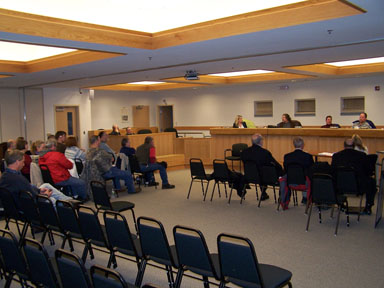
ZBA meeting from Lucente side of the room.
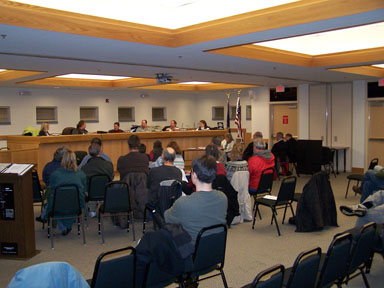
ZBA meeting from the other side of the room.
The ZBA will consider the appeal January 11th, 2011, at 7:30pm.
December 8, 2010
Town Board discussing zoning - density - tonight
The Town Board's last zoning discussion was pretty busy, so hopefully we'll see more of the same this cold night. Apparently, they'll be discussing density tonight, section 600, though I don't think they'd reached that point last month. Commercial zones still seemed to need discussion. We'll see!
The agenda meeting will start at 7:00pm, with the zoning conversation usually starting around 8:00pm. It'll be at Dryden Town Hall, 93 East Main Street (Route 392), Dryden.
December 10, 2010
SEQR main cause of delay on Lucente appeal
This morning's Ithaca Journal reports on Tuesday's super-brief Zoning Board of Appeals meeting, looking more closely at why the ZBA delayed consideration of Varna II. The State Environmental Quality Review appears to be the main reason:
[ZBA Chair] Quinn said that on the advice of board lawyer Kristin Gutenberger, the board held off on deciding whether to grant Lucente a variance for a 260-unit planned unit development on 16 acres of property in the hamlet of Varna because the project's state environmental quality review (SEQR) impact assessment was not finished. Also, [Attorney] Gutenberger wanted a chance to do more research on the legal issues surrounding SEQR.
"SEQR is very critical here, and it's not done yet," Quinn said. "There are still issues that need to be looked into. We as a board want to understand the process entirely so we can make a decision that's best for the whole community."
There's also a piece on energy-efficiency incentives from New York State.
December 13, 2010
VA Clinic coming to Dryden
The Ithaca Journal reports that the Veterans Administration Outpatient Clinic in Cortland is moving to Dryden, where it will serve residents of Tompkins and Cortland Counties. They describe it as being near Phoenix Used Books, but given the construction activity I've seen, I wonder if it's actually next door to Conway Construction, in the old Prudential Insurance building that was Bovis Lend Lease for a while and a temporary home for the Cornell Lab of Ornithology.
I worry a bit about transportation anywhere along 13; Gadabout will certainly work, but visitors who rely on TCAT will have some, uh, interesting road crossing to do.
Pay your taxes first?
Dryden Daily KAZ takes a look at the hard questions of developer responsibility and what we hope to get out of development.
Personally, I've never understood how anyone could expect the Town to help them out (toward making a profit, certainly!) when they're behind on their property taxes, but I haven't had a chance to look at the current tax scofflaws list to know if this is an issue for Varna II in particular.
December 15, 2010
Donations
(An annual story...)
People often seem to make their donations at the end of the year, both for holiday and tax reasons. This is a list of organizations in Dryden that could take donations. I believe, though I'm not entirely certain, that these are non-profit organizations, and therefore tax-exempt, but I could be wrong. Check with the organization if you have a question about that.
I have a highlight for this year, a project that comes to completion in April 2011, the TC3 Civil War Nurses Fund. To quote from their postcard:
2011 marks the 150th anniversary of the beginning of the Civil War. Many women served proudly during this time, yet history has trivialized their experiences and forgotten much of their sacrifices. Locally, four area women left their homes and their families to serve as nurses during this dreadful time.
Together, the TC3 Foundation and the Tompkins County Civil War Commission are raising funds to create a living memorial to these women by establishing three nursing scholarships at the College, as well as creating a Professional Development Endowed Nursing Chair. Our goal is to raise $80,000 by April 2011, and we need your help.
You donation ensures that the sacrifices of these women are not forgotten and that accessible health care remains available locally - your gift creates a lasting legacy.
For more information, call 607.844.8222, Ext. 4366. Donate at www.TC3Foundation.org or The TC3 Foundation, Civil War Nursing Fund, P.O. Box 520, 170 North Street, Dryden, NY 13053.
I've posted a list of churches earlier, and I'm sure they'd all happily accept donations, with the exception of Ellis Hollow Community Church, which closed a few years ago.
Other possible Dryden organizations for donations include:
Bethel Grove Community Center
1825 Slaterville Road
Ithaca, NY 14850Dryden Community Center Cafe
P.O. 801
Dryden, NY 13053
websiteDryden Go-Green Team
c/o Dryden Elementary School (checks payable to Dryden Elementary School)
P.O. Box 88
Dryden, NY 13053Dryden Kitchen Cupboard
Tompkins County Food Pantry
800 Enfield Falls Road
Newfield, NY 14867
websiteDryden Music Boosters c/o Allison Pelletier
155 Creamery Road
Richford, NY 13835Dryden Town Historical Society
36 West Main Street
P.O. Box 69
Dryden, NY 13053
websiteDryden Veterans Memorial Home
2272 Dryden Road
Dryden, NY 13053Dryden Youth Opportunity Fund
Make checks out to Community Foundation of Tompkins County/DYOF
DYOF
P.O Box 1076
Dryden, NY 13053
websiteEllis Hollow Community Center
111 Genung Road
Ithaca, NY 14850
websiteEtna Community Center
P.O. Box 425
Etna, NY 13062Freeville Food Pantry
Freeville United Methodist Church
PO Box 229
Freeville, NY 13068Neptune Hose Company & Dryden Ambulance
26 North Street
Dryden, NY 13053
websiteSaltonstall Foundation for the Arts
P.O. Box 6607
Ithaca, NY 14850
websiteSouthworth Library Association
P.O. Box 45
Dryden, NY 13053
websiteTompkins County SPCA
1640 Hanshaw Road
Ithaca, NY 14850
websiteVarna Community Association
PO Box 4771
Ithaca, NY 14852-4771
websiteVarna Volunteer Fire Company, Inc.
14 Turkey Hill Road
Ithaca, NY 14850
websiteW.B. Strong Fire Company
21 Union Street
PO Box 129
Freeville, NY 13068Willow Glen Cemetery Association
P.O. Box 299
Dryden, NY 13053-0299
If you have additions or corrections, please let me know in the comments. I'm guessing I missed a few.(And thanks to everyone who's helped me add to the list!)
Obama adminstration on hydrofracking
As I just tweeted,
Suddenly Obama's odds of winning Tompkins County, NY in 2012 appear to be less than 100%. http://nyti.ms/euUYx7
Why?
The Obama administration supports a full study of the effects of gas drilling in the watershed that provides drinking water for Philadelphia and New York City, but it doesn't want to wait until it's finished for drilling to begin....
The letter offers the first indication of the administration's position on gas drilling in the Northeast since the day after the Nov. 2 midterm election when President Obama highlighted gas drilling as a potential area of common ground with Republicans.
If the administration isn't particularly concerned about the prospects for poisoning the waters of a few million people, it seems less likely that they'll be interested in smaller-scale problems.
December 16, 2010
Dryden Community Garden awarded grant
Cathy Wakeman's Dryden Town Talk describes a grant Tompkins Trust Company awarded TC3 and the Dryden Community Garden:
According to the award announcement, Kerra [Quinn] and TC3 students Giovanni Griffin and Lauren Fitzgerald will "involve Dryden elementary students and other community members in planting a 'Three Sisters Garden' using traditional Iroquois planting methods for squash, corn and beans. The project will include history, biology and nutrition lessons, as well as intergenerational sharing with the residents of Willowbrook Manor."
Kerra explained more of the vision behind the project during a busy afternoon of caregiving. The team's goal is to make growing local sustainable food a common experience for school children, especially those who might not have opportunity to do this elsewhere. The love of local foods and their history will be explored through children's literature and local lore. Children will be involved in growing food from the planning and planting stages through harvest and creating foods to share. The feast will be shared, along with the lore, with senior members of the community at Willowbrook Manor.
She also reports on Christmas happenings at Dryden churches and schools.
Dryden schools are addressing a variety of recent concerns about athletic uniforms and coaching.
30 fewer jobs at TC3
I'd heard rumors, but it seems to be real:
Tompkins Cortland Community College endured a $2 million cut in state aid from the fall of 2009 to the fall of 2011 budget years. As a result, 30 people no longer work at TC3, according to college President Carl Haynes....
The work force went from the 290s to the 260s, or a 9 percent cut in the school's employment base, he said.
Out of the 30 job cuts, seven occurred through layoffs -- five over the summer and two more in the past couple of weeks, Haynes said.
For now, Haynes believes the "bad news" is out of the way.
December 17, 2010
Ludgate Farms to change hands
After 37 years, Ludgate Farms will no longer be run by Ludgates. It will, however, be staying local, with Dryden residents Katie and Dave Quinn-Jacobs taking over. Ithaca's Food Web has more.
December 18, 2010
Planning Board to vote on Poet's Landing Tuesday
This morning's Ithaca Journal reports that the Village of Dryden Planning Board will vote on a 144-unit housing development along Route 38 this Tuesday:
Mayor Randy Sterling said site approval and the New York State Environmental Quality Review are complete. He said the development, called "Poet's Landing" by its developer, Rochester-based Conifer Realty, will be subsidized to allow for affordable housing for low-income families.
"I think it's a positive for the community, good for Dryden, especially down the road because we'll need more affordable low-income housing in the future," Sterling said.
The project consists of 72 apartment units in nine buildings, a community center and a separate housing building for seniors that contains 72 living units. The project will have private water and sewer that will connect to village mains.
It sounds from the rest of the article that the Village's two main concerns are safety on Route 38, which the New York State Department of Transportation controls, and drainage, as the northwestern edge of the Village is very wet.
(And if you're wondering why the Town's code enforcement officer is quoted in an article about the Village of Dryden, it's because the Village of Dryden contracts for code enforcement with the Town of Dryden.)
December 20, 2010
Living in (more of) Dryden
When I first moved into this house, eleven years ago, I really loved how it was set between the woods and the road. About a year later I realized that the same people who had sold me this house owned the woods, and that I should have asked them about buying a piece of it. Before I could contact them, though, they sold that long strange piece of land to someone else, who built a house at the very top of it. It was still nice to see the woods, but...
A few years later, after learning that we had a friend in common, I contacted the folks up the hill, leaving them some blueberries I'd picked near the property line. We talked, and looked at the woods, but nothing came of it again until this year.
As of Thursday, I now own a chunk of that large parcel, 5.46 acres going up the hill behind my house and two other houses to my east. We extended the top of the Saunders Greenhouse property line on the east to its intersection with the Parke-Dabes Natural Area (Town land) to the west.
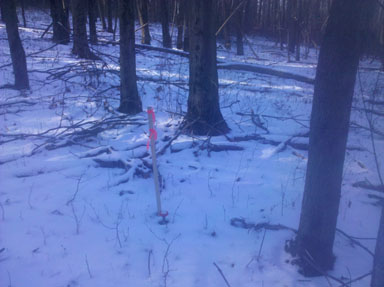
One new survey pin. (Sorry, cellphone picture.)
We're not planning to do anything likely to bother our neighbors. Apart from the no dwellings and no voluntary hydrofracking restrictions on the deed, we're not especially eager to tear down the forest in any case.
Plans include:
Mapping the property in a lot more detail
Marking some trails.
Replacing invasive shrubs (mostly honeysuckle and privet) with natives (like northern spicebush, witch hazel, and assorted viburnums)
Adding more productive plants, notably deer-resistant currants and gooseberries.
There will be more here as we (slowly) get to these projects.
There are a few complications as well, of course. Our house is in the Ithaca City School District, while that land is in the Dryden Central School District, so the parcels have to stay separate. Of course, the forest is also in the Turkey Hill Water and Sewer Districts, so that will bring extra taxes for services we plan never to use there. Overall, though, we decided the complications were worth it.
Thanks to Gene Madsen and Jane Walker for selling us the land, to David Weinstein for telling me I should talk with Gene, and to Mike Lane for handling our side of the transaction. From me personally, thanks to Angelika for her saving ways and my parents for their continuing support of strange projects their son gets into.
Hopefully Konrad and Sungiva will enjoy their large new play area over the next few years.
December 21, 2010
Dryden bails out state
Or at least that's what the Journal's print edition headlined their online article called Town of Dryden awards farm conservation easement funds. Faced with New York State's apparent inability to come up with money they'd committed to, the Town finished the job of buying the farmland protection development rights for Lew-Lin farm. I just hope New York State's good for it. (Yes, I really do wonder given the trainwreck in Albany.)
Cortland Road property owners get a bit of a break on the water shutoff, which moves to July 1st from February 28th.
Dogs at the Tompkins County SPCA on Hanshaw Road will be eating well for a while, thanks to a large donation of food.
While I think it only affects the southeasternmost corner of Dryden, and maybe not much, the state and federal governments reached an agreement on New York's role in improving the Chesapeake Bay watershed.
Finally, just to the west of Dryden, Pine Tree Road residents aren't thrilled about proposals to raise the old railroad bridge. As I watch trucks go by here, I can't say I'm surprised or upset that people wouldn't be thrilled at the prospect of additional passing behemoths. A road, even a highway, used to be a place to get from one place to another; over the last fifty years their side effects of chopping up neighborhoods and making everything around them unpleasant just keep growing.
That story reminds me that a lot of people in the Journal comments and elsewhere grouse about NIMBYism, but I've pretty much had it with that phrase. We'd all be better off if more people cared about their neighborhoods enough to fight for them.
December 22, 2010
Land for sale; some restrictions may apply
A commenter, Jason, has resolved the teepee mystery; the teepees were actually for public use, but the land they were on is to be sold January 8th at the Dryden VFW.
You can find details of the auction at the Zogg Brothers site. We'd looked at some of the parcels above Route 13/366 when Angelika was looking for orchard sites, and they're certainly interesting. However, looking at the auctioneer's site, I'd be very cautious about deed restrictions like this for Lot 3:
EXCEPTING AND RESERVING unto the Grantor, the successor and assigns of the Grantor, forever:
All mineral, oil, gas, timber, hunting, trapping, recreational and educational rights, and the management thereof; including the right to enter and use this property, with invites, at any time, forever, for any purpose of conservation, preservation, or outdoor education and recreation; including but not limited to: tree planting, tree harvesting, invasive species removal, forest product use, the construction and use of: trails, a camping area, shelters, a nature museum, ponds, orchards, tree nursery, a sugar shack (for the production of maple syrup from sap collected on site), natural energy experiments, a community reuse/recycle club and market, a community garden and market, parking area, storage buildings, outdoor adventure camp, wilderness survival camp, and walking, hiking, running, skiing, ice skating, photography, nature study, meditation, outdoor games, etc., free of charge.
SUBJECT TO THE FOLLOWING PERPETUAL DEED RESTRICTIONS:
Grantee may not subdivide or change of the property configuration without the consent (in writing) of Grantor, the successors and assigns of the Grantor.
Grantee's development is limited to the construction of only one primary structure and associated outbuildings for residential use only, disturbing a maximum of one acre, plus a driveway access.
Grantee's use of the remaining portion of the property will be limited to walking, however other uses and development may be allowed, under the management and approval (in writing) of the Grantor, the successors and assigns of the Grantor.
It is clearly understood that the Grantor and the Grantee, their successors and assigns; will not allow mineral, oil, or gas to be leased, sold, or extracted from this parcel, unless both parties agree that said lease, sale, or extraction would not harm, alter, or damage the natural environment of this parcel, and the management of the timber rights will be based on sustainable forestry practices under the guidance of a qualified forester, to produce forest products and maintain the forest health, ecology and diversity, forever.
It may be exactly what you're looking for, but it may well not be.
December 23, 2010
Amazing aerial photos, 1938-1991
Russ Nelson sent me aerial photos Cornell put on line a while ago, but I didn't figure out that you could zoom in on them until last night. Once I did that, I was just plain amazed.
The easiest place to start is here. Click a dot on the part of Tompkins County you want to see. That'll bring you to a picture like this. To zoom in, click on the picture. You can scroll it around with the mouse, and there is a zoom scale across the lower middle of the picture. (If it disappears, which it likes to do, click on the export button at the top right, and it seems to come back.)
The map quality varies by year, and to be honest, I've found 1938 to have some of the best detail.
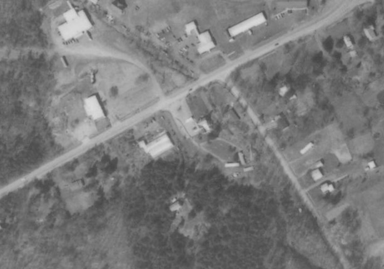
Baker Hill Road and Route 366, 1991
Be careful - you may find yourself spending hours looking around the area.
Poet's Landing decision postponed
The Village of Dryden Planning Board was going to vote last night, but now the vote will be January 6th:
Board members said during Tuesday's special meeting they need more time to assemble conditions for the developers, Rochester-based Conifer Realty, after concerns were raised about safety, flooding, traffic calming and other issues.
Board chairman Gene German said a flashing light will be installed on Freeville Road, a fenced stormwater pond will be dug, active wetlands will be maintained, and a school bus stop will be within the development for children's' safety.
But more than a dozen residents weren't convinced problems had been addressed.
I've not been able to get to any of these meetings, unfortunately, but maybe the 6th... we'll see!
December 25, 2010
More on Ludgate Farms
The Ithaca Journal has more on the sale of Ludgate Farms from the Ludgates to the Quinn-Jacobs. The name will stay the same, but look for more local food options and more canning supplies.
Merry Christmas!
December 29, 2010
Dryden Aquatic Racing Team returns
Cathy Wakeman's Dryden Town Talk reports on the return of "Dryden Aquatic Racing Team, known as DART... a parent-run, not-for-profit developmental swim program for children in grades K-12". She also looks forward to the opening of the Southworth Library's new addition and reports on an event for teens at the library this Thursday from 7:00pm to 9:00pm.
There's a status update on the investigation into the death of a William George Agency resident.
There's a report on worries among Tompkins County residents, and a piece with more details.
As always, New York State will have a few more laws January 1st.
Pollinators of the Laurentian Forest
It's hard to think about pollination when I look out the window and see snow, but this is also the time of year when gardeners drool over seed and plant catalogs and ponder their spring projects.
The Pollinator Partnership's "mission is to protect pollinators, critical to food and ecosystems, through conservation, education, and research." A key part of helping pollinators is supporting them with plantings that keep them going, which means (among other things) reaching a large audience of gardeners. They've created a set of guides you can choose by zip code. The one that applies here is for the Laurentian Mixed Forest Province (4.9MB PDF):
Portions of seven states make up the 147,300 square miles of this province with elevations ranging from a high of 2,400 feet to sea level. The topography primarily includes flat areas, but also includes areas of low rolling hills. This region has many glacial features including lakes, outwash plains, and morainic hills. Average annual temperatures range from 35° to 50°F.
The long, moderately severe winters of this province restrict the growing season for agriculture, leaving only 100-140 frost-free days per year on average. Summer weather is unstable since this province lies within the main cyclonic belt during these months.
This province is characterized primarily by deciduous forests comprised of yellow birch, sugar maple, and American beech, but also includes several species of conifers, including white pine and eastern hemlock.
The plant lists on pages 16-19 are probably the key piece gardeners will want to explore, but there's much more in there about wildlife-friendly landscape practices. You can also read more about the ecoregion here.
(And no, "Laurentian" is not about me. I'm pretty sure it's tied to the St.Lawrence River.)
Building Communities with Farms
While most of my concerns so far with the proposed zoning have had to do with complexity or density, another concern keeps nagging at me. A key reason we're updating the zoning, something discussed as long as I've been in these conversations, is to help agriculture. There's a Rural Agricultural zone, and agriculture is allowed in every zone. Farmstands are permitted in every zone now too, something made explicit in the November revisions.
I've heard some complaints that farming isn't considered the "best and highest use" of land, though I'm not entirely sure what legal difference that would make, or if it belongs in zoning in particular. The piece that strikes me as odd at the moment is the one place that seems not to consider agricultural uses: Planned Unit Development. It isn't entirely banned, because the PUD section is effectively a giant loophole in the zoning - there's no minimum acreage required, and any type of PUD can include "Other uses approved by the Planning Board."
However, in this age of local food - something especially popular in this county - it doesn't seem too far fetched to think of a Planned Unit Development that focuses explicitly on agriculture as its central use with other residential and commercial construction built around that model. A recent report, Building Communities with Farms (7.3MB PDF), takes a detailed look at those possibilities, including the experiences of places that have actually done this. It's not just ecovillages, really - the case studies include five developments in Illinois, Georgia, Vermont, Virginia, and Idaho.
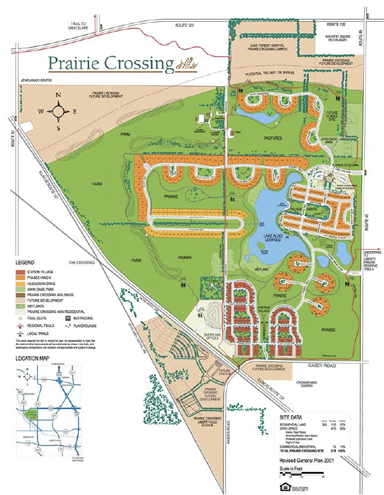
Prairie Crossing (Illinois) development map.
I'm a little bit cautious about this, as a friend asked whether this could be a way to put a Concentrated Animal Feeding Operation (CAFO) next to worker housing next to a slaughterhouse. I suspect it could, even under the proposed zoning as written, given the giant loopholes in the Planned Unit Development section. I'd like to think, however, that this might be a path toward encouraging developers to create places that are more appealing to live in than a condo complex with a convenience store.
December 30, 2010
Get ready for spring gardening
The Dryden Community Center Cafe will be hosting classes on gardening presented by the co-founder of the Dryden Community Garden:
Join us for the first of a new series of free classes at Dryden Community Center Cafe: Grow Your Own. A fresh topic on the third Tuesday of every month 5:30 - 6:30. Intended to be both a class and a discussion group, led by Kerra Quinn (Dryden Community Garden co-founder and Garden Question Answerer At-large), all levels of know-how are asked to attend; meaning - don't just come to learn, if you have garden knowledge please come to share. Bring your favorite seed catalogs.
January's topic:
Seed Selection or
Will I actually eat a rutabaga if I grow them? or
How to not produce more zucchini than anyone really needs.
- Choose your vegetables!
- Deciding that you want to grow your own food and need to have a garden is easy.
- Deciding what to grow and how much seed you'll need to buy and when and where and how to start planting can be daunting.
- A gardener's all time favorite January event - seed catalog perusal.
There will be nice pots of herbal teas from locally harvested plants and homegrown mint. Children are welcome. Be prepared to take notes.
